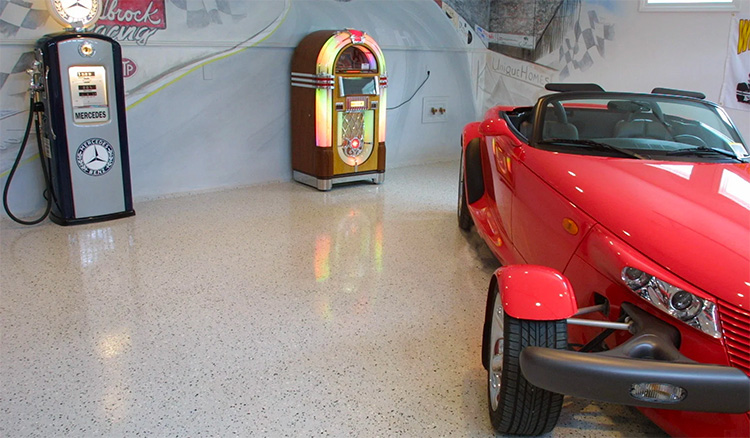What is the Best Resinous Coating for Garage Floors - Epoxy, Polyurethane, or Polyaspartic?
March 23, 2022
1. Surface Preparation
Our Recommendation: If you don’t have or can’t rent a grinding machine, choose Epoxy.
Surface preparation (surface-prep) is critical for the performance of any resinous floor coating. It becomes a vital factor depending upon the type of resin used. The key objective in the surface preparation process is to prepare the concrete substrate so the resin coating will adhere to it properly, creating an invincible bond.
If you are a DIY enthusiast or a contractor who does not have a grinding machine, using an Epoxy coating for the base coat is a good choice. Resins like Epoxy with ‘good wettability’ bond better to the substrate, making surface preparation less critical. For other types of resin, you should rent a floor sander to prepare the concrete substrates.
“Epoxy resins have been used to coat garage floors for over a decade.”
Right: This resin chip floor coating is a perfect example of how a custom epoxy floor can help transform a mundane garage into a human friendly space. While epoxy coatings are excellent, other types of coatings work better depending on the conditions and skill set of the installer.
2. Thickness Requirement
Our Recommendation: Choose Epoxy for unlevel surfaces.
If your substrate is unlevel, you’ll need a thick coating that can help level the floor. In this scenario, Epoxy resin may be the best option.
Epoxy coatings can be mixed with self-leveling additives and applied up to 1/8″ thick. In contrast, Polyurea or Polyaspartic coatings cannot be used more than 10 to 12 mil thickness in a single pass. (1 mil = 1/1000th inch). Moreover, applying polyurea or polyaspartic coatings in multiple layers can become very expensive.
3. Ambient Temperature
Our Recommendation: For installation in Cold environments, use a Polyaspartic or Polyurea resinous coating.
Polyurea or Polyaspartic coatings cure quickly in cold temperatures. It takes 2 to 4 hours for these coatings to cure in temperatures of 40°F or below.
In contrast, Epoxy takes 24 to 36 hours to cure in cold environments. Cold cure hardeners are available for Epoxy that will enable it to cure faster, though these hardeners will make the final coating less UV stable.
4. Installer Experience
Our Recommendation: Inexperienced installers should choose an epoxy resin coating.
Epoxy resins take longer to set (25 minutes), whereas polyurea/polyaspartic resins set much quicker (10 to 12 minutes). Inexperienced installers may find the short set time of polyaspartic and polyurea coatings very challenging.
5. Quick Return to Service
Our Recommendation: Use Polaspartic or Polyurea resinous coatings if downtime is your primary concern.
Polyurea and Polyaspartic are the best options for garage floor coatings if a quick return to service is a prime criterion. A two or three-car garage floor can be installed in a day by an experienced contractor using these coatings. Polyurea and Polyaspartic resins have become very popular in “One-Day Flooring Systems.”
Our Overall Recommendation.
For DIY enthusiasts and Inexperienced Contractors
DIY enthusiasts and contractors with little experience may want to use an Epoxy resin basecoat followed by a Polyaspartic topcoat. This choice will make the installation easier while providing the UV and quick return to service benefits of the polyaspartic resin.
For Experienced Contractors
Experienced contractors with grinding machines will probably want to use Polyaspartic and Polyurea on level surfaces. This choice provides the fastest return to service possible at any temperature.
Learn How to Upgrade Your Garage Floor with Epoxy Coatings
Interested in adding epoxy coatings to your garage floor? We have the resources to help. Watch our garage floor installation videos to learn how to add a professional-grade epoxy coating system to your garage floor.
@duraamen #duraamen #flooring #concreteresurfacing #concrete #concretewalls
Company: Duraamen Engineered Products Inc.
Of: Duraamen Engineeed Products
Source: https://duraamen.com/blog/choosing-best-coating-for-garage-floors/
Tags:
Coating
HERMETIC™ Flake Flooring Systems for commercial, industrial and residential spaces (October 29, 2021), Sherwin-Williams 2022 Colormix® Forecast's Method palette (September 29, 2021), TIGER Drylac® powder coatings for agricultural and construction machinery (September 10, 2021), Sherwin-Williams Living Well™ Collection: Reflect (August 30, 2021), The Reflector™ Enhancer Flooring System - a specialty, high build, self-leveling, fluid-applied floor coating (August 9, 2021), Benefits of Anodized Powder Coatings (June 7, 2021)
Color
Finishes
How Important is Wellness in Your Designs? (November 3, 2021), HERMETIC™ Flake Flooring Systems for commercial, industrial and residential spaces (October 29, 2021), Sherwin-Williams 2022 Colormix® Forecast's Method palette (September 29, 2021), TIGER Drylac® powder coatings for agricultural and construction machinery (September 10, 2021), Sherwin-Williams Living Well™ Collection: Reflect (August 30, 2021), The Reflector™ Enhancer Flooring System - a specialty, high build, self-leveling, fluid-applied floor coating (August 9, 2021), Houston House: StoTherm® ci with Stolit® Milano finish provides comfort and visual appeal (July 7, 2021), June's Color of the Month: Commodore (SW 6524) (June 30, 2021), Benefits of Anodized Powder Coatings (June 7, 2021), Maxxon® Commercial MVP One Primer (April 28, 2021)
Floor
Precast terrazzo: the elegance and everlasting beauty is indisputable (December 23, 2021), HERMETIC™ Flake Flooring Systems for commercial, industrial and residential spaces (October 29, 2021), Lamit Structural Insulated Panels (SIPs) (August 20, 2021), The Reflector™ Enhancer Flooring System - a specialty, high build, self-leveling, fluid-applied floor coating (August 9, 2021), More medical cannabis flooring systems being specified (October 5, 2020), Give your elevator a lift with a resinous floor system designed specifically for elevator cab floors (May 13, 2020)




